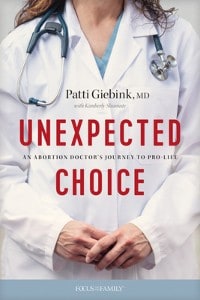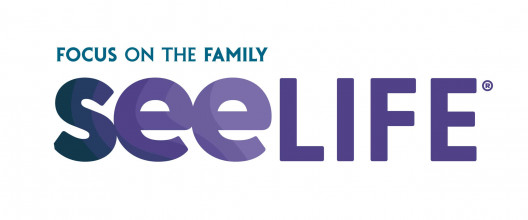Dr. Patti Giebink: And I just intensively was studying the Bible with direction and understanding it. And at some point, and I, I don’t exactly know when, but it became so clear to me that, that God is a God of life. That’s His character, that’s His heart. There should be no question.
John Fuller: That’s Dr. Patti Giebink, an OB-GYN and former abortion doctor who experienced a dramatic transformation in her beliefs about abortion and its tragic consequences for women, children, and families. You’ll hear more of her riveting story today on Focus on the Family with Jim Daly. I’m John Fuller, and thanks for joining us for this really important conversation.
Jim Daly: John, the late Dr. Francis Schaeffer, who was a Christian philosopher, was incredibly prophetic more than 40 years ago when he warned about the slippery slope of abortion and how it would lead our society to devaluing human life. And I believe we’re seeing that today. Even after Roe v. Wade was repealed in 2022, the cultural and moral battle to protect life from preborn children to the elderly is ongoing. And we in the Christian community cannot be silent about this critical issue. Uh, that’s why we’ve invited our guest to share her story. Dr. Giebink was, as you mentioned, a former abortion doctor working for Planned Parenthood. She believed she was helping women until she discovered some unsavory facts about the abortion industry. And eventually, she started reading scripture and came to know God for herself, who is the Author of life. Today, Patti is passionate about sharing God’s heart for life and offering women alternatives to abortion.
John: And our goal here at Focus on the Family is to help motivate you as a believer, to be bold in your pro-life beliefs and to take action to protect preborn babies and their moms.
Jim: Absolutely. And one way we do that is through Option Ultrasound, where we support pregnancy centers across the nation, giving them financial grants to provide ultrasound machines, on-site nurses, medical training, and so much more. And thanks to the generosity of so many friends, more than a half a million babies have been saved from abortion through this program. That’s really good news.
John: It really is. And, uh, at our website we’ll have more details about Option Ultrasound and how you can get involved in pro-life ministry. We’ll also have details about Dr. Giebink and her fascinating book, Unexpected Choice: An Abortion Doctor’s Journey to Pro-Life. Visit focusonthefamily.com/broadcast for the details, or call 800, the letter A and the word FAMILY.
Jim: Patti, welcome to Focus on the Family.
Dr. Giebink: Thank you.
Jim: I’m actually thrilled to talk with you because you have such a unique perspective given the journey God has, (laughs) uh, put you upon. I mean, it’s amazing. Um, how were you first exposed to abortion? Let’s start there.
Dr. Giebink: Oh, that’s a good question. Um, I grew up in a very liberal household, and I remember talking to my dad when he was, um, an intern, and he was… He talked about the illegal abortions and women coming to the ER and, uh, infected and bleeding. And so, I kind of went down a path of being pro-choice, never really thinking I would become an abortion doctor. That wasn’t, it really wasn’t my plan. With all the history pre Roe v. Wade women dying or becoming physically injured by illegal abortions, you know, that’s what was so prevalent among these women’s groups when I was in medical school. And I studied Roe v. Wade, read a lot of books on it. And the interesting thing is… And so, between my, my dad and what I was hearing, and I didn’t know that the numbers were inflated of the number of women dying every year from illegal abortion.
John: Mm.
Jim: Correct. They just picked a number.
Dr. Giebink: Well, I suppose I had my aha moment when I was reading Bernard Nathanson’s book. Dr. Nathanson is a former abortion doctor. He has since died, but he talks about pre Roe v. Wade, how they knew that the only way they were gonna get public support was to inflate the numbers and-
Jim: Of women dying from-
Dr. Giebink: Of women dying-
Jim: … back alley abortions, so called.
Dr. Giebink: … from illegal abortions. The, the deaths and the injury and, uh, because they had to really rally support for Roe v. Wade. And so, they really inflated the numbers. And of course, I didn’t know that. A- and it just really stopped me in my tracks and, and I thought, okay, the foundation for doing what I was doing was gone.
John: Because it was predicated on a lie.
Dr. Giebink: On saving women’s lives.
John: Yeah.
Dr. Giebink: Providing good healthcare, saving women’s lives, keeping them from, um, some unsafe thing. And I remember the women in the, uh, pro-choice women’s groups had significant history, and they would talk about their experiences, and it, it was awful. Um, ultrasound was probably not even available in early Roe v. Wade. It was just in its infancy. And so, there wasn’t that option. And we didn’t know everything we know now. So, in the mid-’90s, 1990s when I was working at Planned Parenthood, and I said, “Well, it’s just tissue, you know? It’s, it’s just tissue.”
John: Mm.
Jim: Yeah. Let’s go back to 1995. You begin working at Planned Parenthood. Uh, describe… I think the first two years you were part-time.
Dr. Giebink: Yeah.
Jim: And then your third… In your third year, you became full-time.
Dr. Giebink: Yeah.
Jim: So, just describe that decision and your own practice. You sold it and then you moved into full-time eventually with Planned Parenthood.
Dr. Giebink: Well, I had my own practice. Um, I was very busy in obstetrics delivering babies, and the solo, uh, abortion doctor wanted to retire. So, he made an arrangement with Planned Parenthood, and they approached me and asked me if I would do abortions one day a week. Their abortion day. They didn’t do abortions every day. They did them only as often as they had people. So, I would be doing, delivering babies like the day before and the day after, and then I’d go do the abortion day, um, which at the time wasn’t too bad. I mean, when I think back and I think, well, that’s kind of mentally schizophrenic, you know? Working really hard to save my OB patients and their babies. And, and then the next day going in and doing pregnancy terminations.
Jim: Did, did that plant a seed of doubt for you? I mean, you describe it like that now. Was that the beginning of your uneasiness or your wrestling with this? Was that contradiction that you had to live through?
Dr. Giebink: Not really. Um, I think sometimes as an a- in order to do abortions, we put pretty thick blinders on, you know?
Jim: Yeah.
Dr. Giebink: Stay focused. Um-
Jim: That’s, that’s the big part of the story, right?
Dr. Giebink: Yeah.
Jim: I mean, you’re just, in essence, a scientist and you’re performing a scientific routine-
Dr. Giebink: Right.
Jim: … to take care of this woman’s difficulty.
Dr. Giebink: Right.
Jim: In that regard, uh, while you’re at Planned Parenthood, you wanted to do more to invest in women’s healthcare and, and Planned Parenthood didn’t respond that well to that. What, what was that contradiction that you saw working in Planned Parenthood?
Dr. Giebink: When they, um, made me an offer to close my practice and work there full time, I don’t even remember how I considered it, but I did. And I ended up closing my practice and working there full time. And again, still just doing abortion day and then doing non-abortion things on the other days that I was working there, which could be OB ultrasound, dating ultrasounds, GYN exams.
Jim: But in that healthcare desire, you kind of were met with, uh, a cold shoulder, is the way I read it, that they weren’t as interested in providing healthcare. They were about queuing up the abortions and let’s keep it moving forward, basically. Did I read that correctly?
Dr. Giebink: Yeah. Make no mistake, they’re about money and abortion is their top moneymaker. And I remember that, that we had a point where we’d break even, we had to do at least, I can’t remember if it was eight or 10 procedures to break even on abortion day. And of course, then we’d had considerably more procedures, so then anything above that would be profit. Um, my passion has always been to help women, um, to provide good healthcare. And I didn’t… When I was working part-time, I didn’t… You know, abortion days were really crazy, and I didn’t really think about, is this good healthcare or not? It was just, you know, busy. But when I worked there full-time, it really became apparent to me that, uh, that my hands were tied as far as providing good healthcare. At the, at that time, it was, uh, pages and pages in a big, thick manual about protocol and what you can do and what you can’t do, what you can say, what you can’t say, what your job is. Um, and it was very clear to me that I was a technician. It wasn’t my job really to counsel or do anything that isn’t in the manual.
Jim: In fact, you had a woman show up at the clinic who was struggling with that decision. Describe that interaction and what was the outcome?
Dr. Giebink: Well, like I said in the book, I didn’t really see the patient until she got into the exam room, the procedure room, which was a very small room, and she’d already been, paid her money, been counseled, signed all the forms, had her labs, her ultrasound. And then she comes into the room and I have about two minutes to talk with them before I start the procedure. Um, and I always kind of get a feeling for if… She was really ambivalent. She was clearly undecided. And I said, “You know, you, you seem to be struggling with something.” And she said, well, she really didn’t wanna do this, but she already paid her money and she traveled to get there, and so she might as well just go through with it.
John: Mm.
Dr. Giebink: And I said, “Well, you know, you can reschedule. If, if you’re unsure, reschedule. Come back and, when you’re sure.”
Jim: Take more time to think about it.
Dr. Giebink: Yeah. You know, you don’t have to do this today. She was so afraid she wasn’t gonna get her money back. And I said, “You will get your money back.” Um, but she said, “No, I just wanna go through with this.” And so, I did. And, uh, I probably said that one too many times where I said, “You know, you, you, you don’t seem to have your mind made up and, and maybe you should just reschedule.” That was kind of what I would say if they seemed to be kind of uncertain. And I guess that wasn’t the, the company line.
Jim: The handlers weren’t happy with that.
Dr. Giebink: Yeah.
Jim: That’s terrible. Uh, you do in the book, describe that tumultuous environment at Planned Parenthood. Um, just speak to the clinic itself. A lot of, a lot of people listening have never had that experience, obviously, and maybe they’ve had a friend. But describe what your experience was as a physician working in there. The cleanliness or the lack thereof, the, the orderliness or the lack thereof with the clinic itself.
Dr. Giebink: It was a small building. It, it really wasn’t all that clean. And in the three years that I was involved with Planned Parenthood there, I never saw anybody from the Health Department.
John: Hmm.
Dr. Giebink: Never. And the, the people that they had counseling were not necessarily professional counselors, but all they had to do was read the script and get them to sign. I, many years later, I went back into the same building and it had been converted, uh, first into a branch of the Pregnancy Resource Center.
John: Hmm.
Jim: Which is a pro-life group.
Dr. Giebink: Pro-life group. And, but the first time I went into the building, I think I lasted about 20 seconds before I had to run back out. And that was after it had been cleaned up. And I know, um, the Pregnancy Resource Center and the, uh, founder is a good friend of mine, and she was telling me about when… First of all, they bought the building anonymously, um, a name, actually, Cattle on a Thousand Hills.
John: (laughs)
Dr. Giebink: Um, they bought the building and she said, when they went there, it, it was just filthy. And I said, yeah, I mean, I, it just didn’t have that level of cleanliness that a, a private clinic would have.
Jim: Well, let me just add in there, uh, Patti, which is so important. So many states that support abortion do so little to regulate those clinics that they are, they, they’re just filthy and so far, under the standard. And there have been some courageous people that have had to, you know, try to document that on video. And they are the ones that end up in jail. It, it’s so bizarre. And everybody’s claiming to be pro-woman, and yet they let these women go into these environments that are disgusting, that are so far below even third world standards in some cases, that it’s terrible. It shows you their support of the ideology over truly the-
John: Mm.
Jim: … well-being of a woman. And that, that’s plain to see. If you fight in this arena spiritually, you see it as clear as day. And again, you’ve seen both sides of this. And it’s, it’s what’s so amazing about your story. I- in that context. Um, let’s move to your spiritual development. I mean, you’re working at Planned Parenthood. A friend, I believe, invites you to come to a church around the corner from the clinic if I remember the story correctly.
Dr. Giebink: Um, just mentioned there was a new pastor at this church, and I wasn’t really looking for a church. Um, I was kind of going down the New Age path, searching, you know, people who are in New Age and other things are, are searching. And he just kinda offhand said, they have a new pastor, you might like this church. And I had, I didn’t know anybody in the church, very small. And, but they had a new young pastor. And I was just captivated. And for the first time in my life, I just felt so drawn to this church and to the Bible. And I, I- it’s like they talk about in, in the Bible about the scales coming, falling off your eyes. And so, I started reading the Bible and, and starting to understand it. And I, for about a year and a half, I just intensively studied the Bible. I didn’t have a real job at the time, and I just intensively was studying the Bible with direction and understanding it. And at some point, and I, I don’t exactly know when, but it became so clear to me that, that God is a God of life. That’s His character, that’s His heart. There should be no question.
Jim: That’s powerful.
Dr. Giebink: Yeah.
Jim: People can’t miss that. I mean, you’re coming from, uh, being an abortion doctor, going to this church, reading the scripture deeply, perhaps for the first time.
Dr. Giebink: Mm-hmm.
Jim: And your conclusion as a very smart person is God as a God of life.
John: Hmm.
Jim: That’s what, that is what we proclaim. That’s our only beef with the abortion industry, is that it’s the exact opposite of God’s heart for His creation.
Dr. Giebink: Yeah.
Jim: Then what happened?
Dr. Giebink: Well, that’s all God. I mean, I, I can’t take any credit for any of this journey because I wasn’t, I wasn’t looking. I was searching for something bigger than, you know what, at the beginning, another piece of the puzzle that’s so important is that in 2004, I started working with a very solid, pro-life, Catholic doctor in our small town. She was unapologetically pro-life. And I was still kind of in that, I wasn’t admitting that I had changed and I… Because basically all my friends and most of my family were pro-choice. And, but just listening to her and her courage, and she gave me strength to start thinking more of, of that. And so, by 2006, which was the first Vote Yes For Life campaign, where really kind of, the first time I really stepped out and said, you know, I’ve, I’ve changed. So, that’s from 2001 to 2006, you know, that’s five years of gradual, painful, uh, realization.
Jim: Yeah. And that’s, you know, that’s the sanctification process.
Dr. Giebink: Yeah.
Jim: That’s what happens.
Dr. Giebink: Yeah.
Jim: And that’s what’s so wonderful about the Lord removing the scales from our eyes, right?
Dr. Giebink: Yeah.
John: Mm-hmm.
Jim: And then we begin to see what is true.
Dr. Giebink: Yeah.
Jim: That He’s a God of life.
John: Mm-hmm.
Dr. Giebink: Yeah.
Jim: As you said. And that’s what’s so beautiful. You, you found out that a pro-life woman, I think she was a nun, had been praying for you for 10 years. I love this aspect of your story because it shows that the, the prayers of the righteous availeth much, right? (laughs) And so this is awesome that people were praying for you by name.
Dr. Giebink: Mm-hmm.
Jim: They knew what was taking place, but they still took the time to, and really a fair definition, to love you enough to pray for you.
John: Mm.
Dr. Giebink: Mm-hmm. She still prays for me.
John: And you had never met her-
Dr. Giebink: I had never met her.
John: … during that process.
Dr. Giebink: No. She wrote me a letter, uh, in December 2006, and I was stunned. And she said this was now 10 years that she had been praying for me based on an article in the local newspaper. And she saw my name. And, and what caught her attention was I said something, well, it wasn’t my goal to do a-abortions full time. And she hung on that statement and started praying for me, and then wrote me a letter when, through the Vote Yes for Life campaign, I actually ended up doing a TV commercial where basically, I said who I was and what I used to do, and that I was asking them to vote yes for life on this-
Jim: Ballot initiative.
Dr. Giebink: … ballot initiative. And so, she saw that, which was confirmation of her 10 years. And then she, she took the initiative to, uh, write me a letter, didn’t have the right address. It went to the wrong clinic, but it found me.
John: Hmm.
Dr. Giebink: And I was just flabbergasted. I, I was just stunned.
John: Mm.
Jim: Yeah. And it’s a beautiful story of the things we can do. Um, and you know, also the things we should not do. In that regard, when you look at the battle and it go- We, we see this as a spiritual battle.
Dr. Giebink: Mm-hmm.
Jim: You know, we’re all created in God’s image. Even those that are on the abortion side are created in God’s image. And we need to respect that, c- certainly as believers in Christ. So, what are the things that you’ve learned, Patti, about the battle, and especially being in both camps as you have been?
John: Mm-hmm.
Jim: What are the lessons that you can share with us in ways to be effective in communicating God’s truth? That He loves them, He cares for them, but that He is a God of life? I love that description. W-what have you learned from both perspectives?
Dr. Giebink: Um, when I was doing abortions and there would be people protesting on the sidewalk ’cause I would be driving in, they never really screamed at me or anything, but it, it never made me reconsider what I was doing. Um, and I, the more I think about it, we’re not going to make progress if we just stand on opposite sides of the street calling each other names.
Jim: Right.
Dr. Giebink: And so, really, the reason I wrote the book was I want both sides to see the other side. I, I want people to be, I wanna challenge their thinking because I, I hear things that aren’t quite true on both sides.
Jim: Mm.
Dr. Giebink: So, I really want, want people to, to have a little more understanding.
Jim: Sure. Uh, Patti, right at the end here, uh, I’m mindful as we always are, John, that people listening, women particularly, but men too, where abortion has impacted than directly, a woman made that choice. She may have never shared that with anybody.
Dr. Giebink: Mm-hmm.
Jim: And she’s in a church now, and she’s given her life to the Lord. And that was a decision that may have been made 10 years ago, 20 years ago, who knows? 40 years ago. And she still carries that burden.
Dr. Giebink: Mm.
Jim: And obviously, uh, as a doctor, but also as a Christian woman, what would you say to her now?
Dr. Giebink: Tell someone, speak up. Um, confront your pastor. Not in front of the whole church, you know? Pull them aside and say, you know, I, I, I respect that, that your pro-life and everything, but I’ve been hurt by abortion, and I’m sure there’s other people, and we need to find a different language. We need to find compassion. Um, we are all sinners. Um, if a pastor of a church doesn’t hear now and then from somebody in his church who’s been hurt by abortion, then that pastor should wonder, why aren’t people speaking up? How can I be a safe place? Maybe you just need to announce that you know, that you’re open to meeting with people who’ve been hurt by abortion. You’re not, you’re not judgmental and you wanna lead them to a path of healing or provide resources. And I remember a friend of mine said something about making our neighborhoods safe, you know? Do you know your neighbor? Do you have a young woman who might be in a crisis? Are, are we reaching out to them or are we just in our own little world where we’re surrounded by other people that look and act like us? Um, I quoted Moshe Dayan at a conference I did a couple weeks ago, and he was a freedom fighter for Israel. And he said, “If we want to make peace, we don’t talk to our friends. We have to talk to our enemies.”
John: Mm.
Dr. Giebink: So, we have to reach out in some way, even if it’s not about this topic. Um, for me, I have to force myself. I have to think, okay, how, how can I reach out? Talk about the weather, talk about something. And so, for, for my family, I just try and love ’em where they are, love them where they are, and, and hope that they will see the change in me and eventually ask, you know, or read the book. So-
Jim: (laughing) Yeah, it’s a good starting point. Patti, this has been great.
John: Yeah.
Jim: I’m reminded of that wonderful scripture. Romans 2:4. Uh, “Don’t, you know, it’s God’s kindness that leads one to repentance.”
Dr. Giebink: Yeah. Yeah.
Jim: And that pulses through me when I’m engaging with people from-
Dr. Giebink: Yeah.
Jim: … Planned Parenthood or the abortion industry or NARAL, for that matter, the LGBTQ community as well.
Dr. Giebink: Yeah.
Jim: Um, that’s how they’re going to be attracted to the gospel, and that’s what the Lord does.
John: Mm-hmm.
Jim: And, uh, just knowing that He cares for every person, again. And that nobody’s beyond His reach. That’s what I hear you saying-
Dr. Giebink: Yes.
Jim: … loud and clear. And we need to pray for those people. And I want to congratulate you again for, uh, uh, you know, again, you had to have an open heart. You’re in the, the mire of the battle when you were working for Planned Parenthood, you could have easily kept the blinders on, but something in your heart kept you moving in a direction toward God’s heart.
Dr. Giebink: Mm-hmm.
Jim: And I’m very intrigued by that because that is the great part of the journey for everyone who sees the truth and embraces God’s love and moves forward in that regard. And I wanna encourage the listeners, uh, if Patti’s story has challenged you and motivated you to get involved in pro-life ministry, contact us right away. We have some ideas about how you can get plugged in with the pregnancy center right away. We’d also invite you to support Option ultrasound. We’ve done the research, we’ve been at it 20 years. It takes about $60 to save a baby’s life, only $60, which is a huge savings when you consider the average abortion is about six to $700. When you give to Option ultrasound, you help equip pregnancy centers to show women the truth about the baby inside their womb. And we hear so many stories about that where the mom is peering in, a baby is sucking its thumb or putting its hands behind its head. It’s, and that just makes the difference. The women just come alive and go, wow, that’s a baby.
John: Mm.
Jim: Let’s help more women see that, uh, perspective and choose life.
John: Mm-hmm.
Jim: And again, more than half a million babies and moms have been rescued so far.
John: Yeah. Join the support team for Option Ultrasound. Make a Difference. It takes $60 to save a baby’s life. Uh, make that a monthly pledge, ongoing if you’re able to, or, uh, a one-time gift is certainly appreciated. Either way, we’ll say thank you for your generosity by sending a copy of Dr. Giebink’s book, Unexpected Choice: An Abortion Doctor’s Journey to Pro-Life. Our number 800, the letter A and the word FAMILY, 800-232-6459 or donate at focusonthefamily.com/broadcast.
Jim: I mean, think of that. $60 a month, a baby a month. Can you help us?
John: Yeah. Please join the support team today for Option Ultrasound. It takes just $60 to save a baby’s life. And, uh, we’ll say thank you for your generous donation by sending a copy of Dr. Giebink’s book, Unexpected Choice: An Abortion Doctor’s Journey to Pro-Life.
Jim: In fact, John, we’re looking for 1,000 people to make that monthly commitment of $60. Uh, think of that, being able to save a baby’s life every month. Can we count on you?
John: Hmm. Yeah. Join our Friends of the Family community and make that monthly pledge when you call 800, the letter A and the word FAMILY, 800-232-6459 or you can donate and, uh, join the support team at focusonthefamily.com/broadcast. Thanks for listening to Focus on the Family with Jim Daly. I’m John Fuller, inviting you back as we once again help you and your family thrive in Christ.























